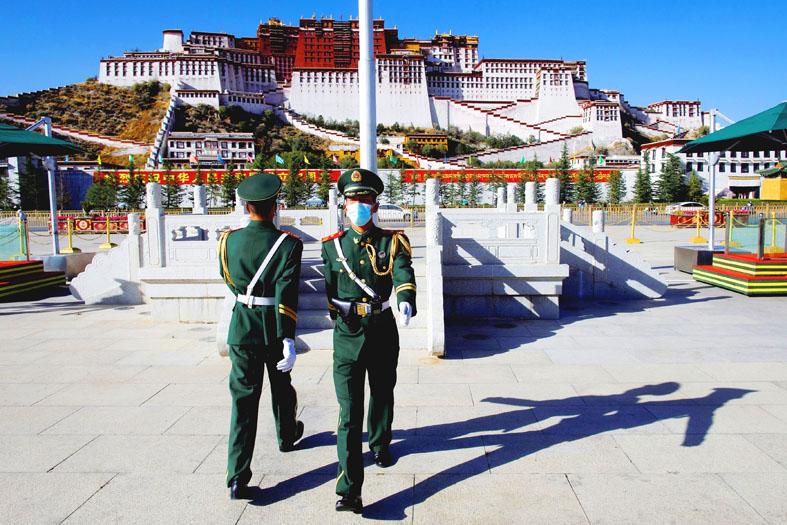The political head of Tibetans in exile yesterday welcomed legislation passed by the US Congress that reaffirms the rights of Tibetans to choose a successor to their spiritual leader, the Dalai Lama, a move that infuriated China.
China regards the exiled Dalai Lama as a dangerous “splittist,” or separatist, and the latest show of support from the US Congress could increase already tense ties between the two nations.
Lobsang Sangay, president of the Tibetan Central Administration (CTA), which is known as the Tibetan government-in-exile, said that the passing by the US House of Representatives and the Senate of the Tibet Policy and Support Act (TPSA) was historic.

Photo: Reuters
The Chinese Ministry of Foreign Affairs accused the US of meddling in its internal affairs and warned the US against signing the legislation into law.
China seized control of Tibet after its troops entered the region in 1950 in what it calls a “peaceful liberation.” Tibet has since become one of the most restricted and sensitive areas in the country.
The Dalai Lama fled into exile in India in 1959 after a failed uprising against Chinese rule.
The legislation calls for the establishment of a US consulate in Tibet’s main city of Lhasa, the absolute right of Tibetans to choose a successor to the Dalai Lama and the preservation of Tibet’s environment.
The legislation also proposes a “regional framework on water security” and greater participation from the community in dialogue with China on monitoring the region’s environment.
“The People’s Republic of China has already completed water transfer programs diverting billions of cubic meters of water yearly and has plans to divert more waters from the Tibetan plateau in China,” the bill said.
Environmental groups and Tibetan rights activists have expressed concern about China’s hydropower ambitions in the region, saying they could affect downstream water supplies.
China has said its leaders have the right to approve the Dalai Lama’s successor, which many see as a coercive attempt to control Tibet, where ethnic Tibetans make up about 90 percent of the population.
“By passing the TPSA, Congress has sent its message loud and clear that Tibet remains a priority for the United States and that it will continue its steadfast support for His Holiness the Dalai Lama and the CTA,” Sangay said.
“This is a victory for the Tibetan freedom struggle,” he added.

US President Donald Trump yesterday announced sweeping "reciprocal tariffs" on US trading partners, including a 32 percent tax on goods from Taiwan that is set to take effect on Wednesday. At a Rose Garden event, Trump declared a 10 percent baseline tax on imports from all countries, with the White House saying it would take effect on Saturday. Countries with larger trade surpluses with the US would face higher duties beginning on Wednesday, including Taiwan (32 percent), China (34 percent), Japan (24 percent), South Korea (25 percent), Vietnam (46 percent) and Thailand (36 percent). Canada and Mexico, the two largest US trading

China's military today said it began joint army, navy and rocket force exercises around Taiwan to "serve as a stern warning and powerful deterrent against Taiwanese independence," calling President William Lai (賴清德) a "parasite." The exercises come after Lai called Beijing a "foreign hostile force" last month. More than 10 Chinese military ships approached close to Taiwan's 24 nautical mile (44.4km) contiguous zone this morning and Taiwan sent its own warships to respond, two senior Taiwanese officials said. Taiwan has not yet detected any live fire by the Chinese military so far, one of the officials said. The drills took place after US Secretary

CHIP EXCEPTION: An official said that an exception for Taiwanese semiconductors would have a limited effect, as most are packaged in third nations before being sold The Executive Yuan yesterday decried US President Donald Trump’s 32 percent tariff on Taiwanese goods announced hours earlier as “unfair,” saying it would lodge a representation with Washington. The Cabinet in a statement described the pledged US tariffs, expected to take effect on Wednesday next week, as “deeply unreasonable” and “highly regrettable.” Cabinet spokeswoman Michelle Lee (李慧芝) said that the government would “lodge a solemn representation” with the US Trade Representative and continue negotiating with Washington to “ensure the interests of our nation and industries.” Trump at a news conference in Washington on Wednesday announced a 10 percent baseline tariff on most goods

THUGGISH BEHAVIOR: Encouraging people to report independence supporters is another intimidation tactic that threatens cross-strait peace, the state department said China setting up an online system for reporting “Taiwanese independence” advocates is an “irresponsible and reprehensible” act, a US government spokesperson said on Friday. “China’s call for private individuals to report on alleged ‘persecution or suppression’ by supposed ‘Taiwan independence henchmen and accomplices’ is irresponsible and reprehensible,” an unnamed US Department of State spokesperson told the Central News Agency in an e-mail. The move is part of Beijing’s “intimidation campaign” against Taiwan and its supporters, and is “threatening free speech around the world, destabilizing the Indo-Pacific region, and deliberately eroding the cross-strait status quo,” the spokesperson said. The Chinese Communist Party’s “threats